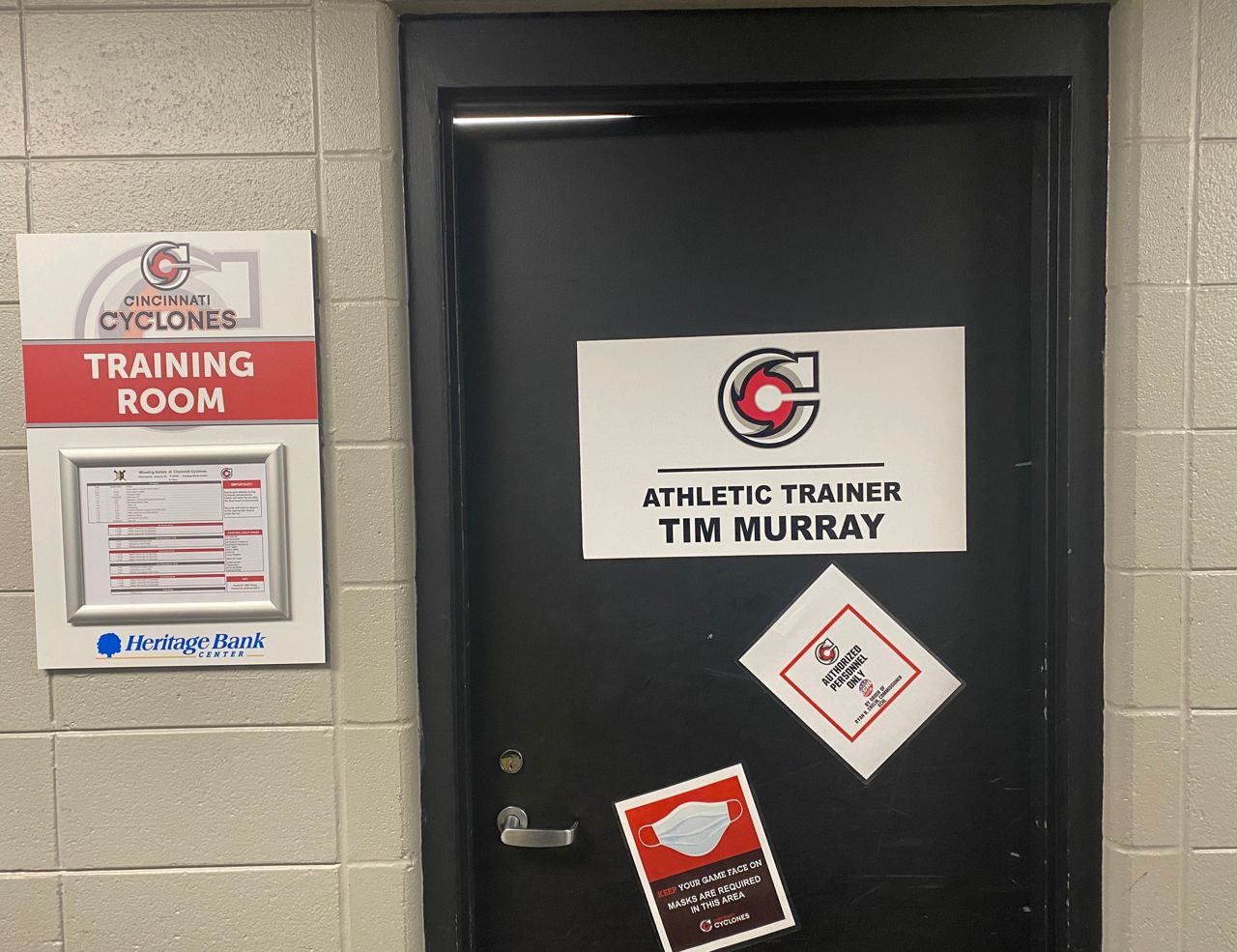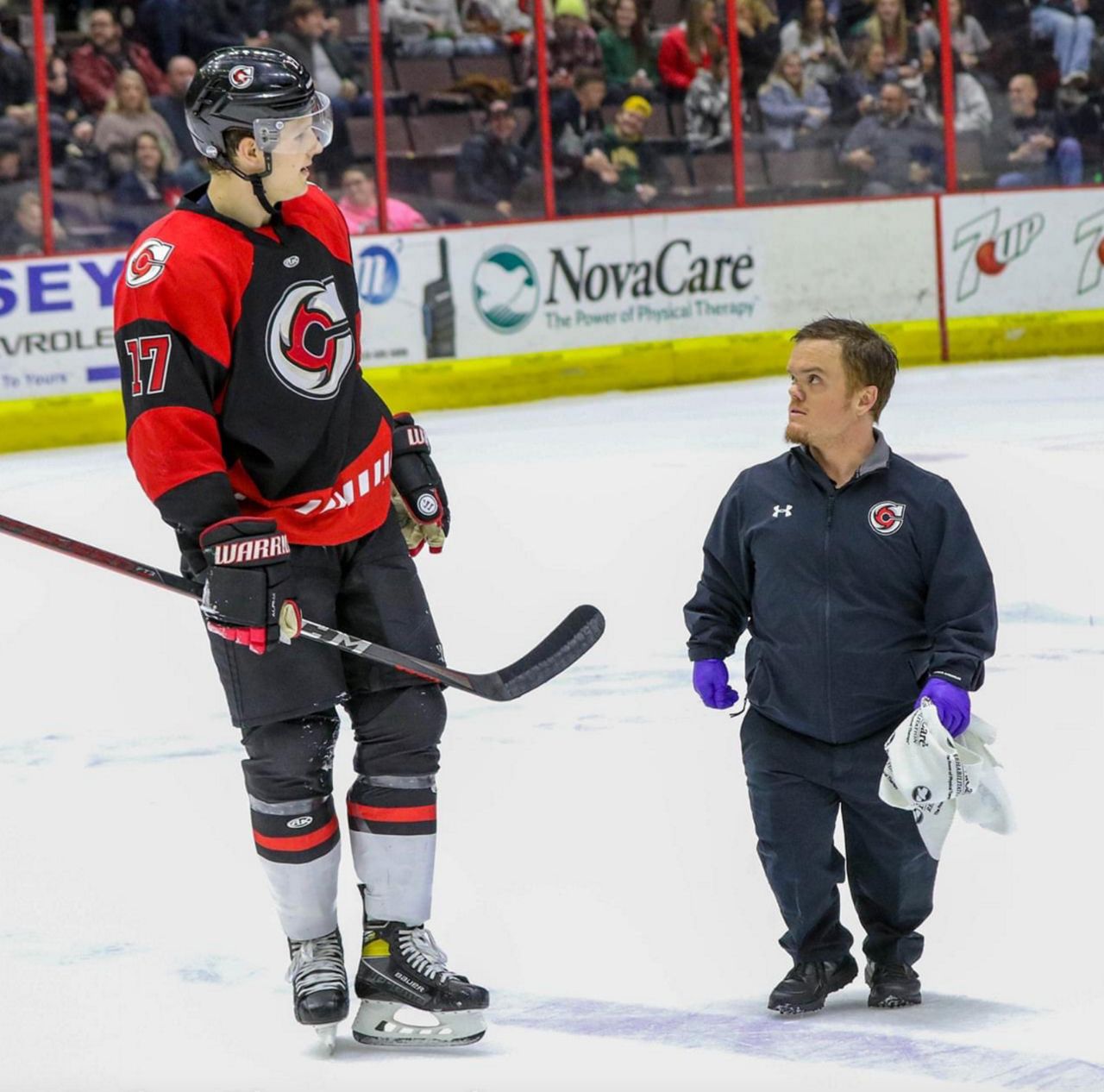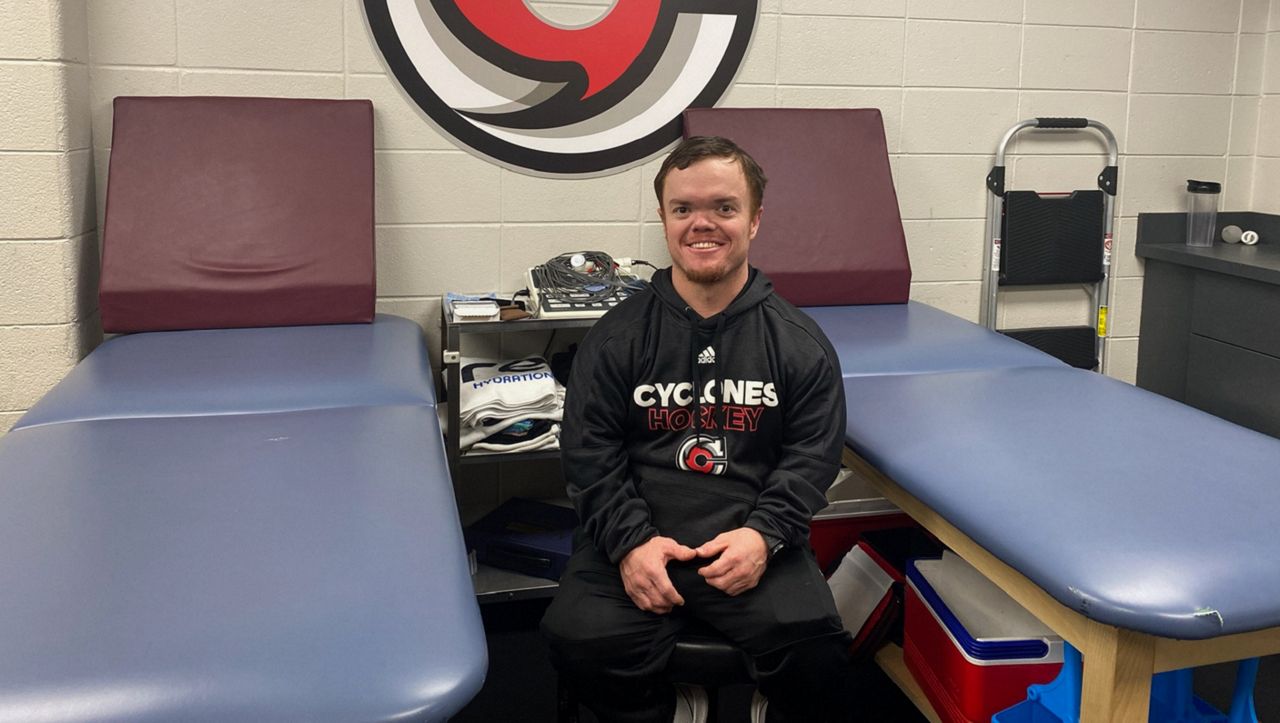CINCINNATI – Tim Murray loves sports. Like, all of them.
What You Need To Know
- Tim Murray, athletic trainer for the Cincinnati Cyclones, has dwarfism
- A huge sports fan, Murray selected athletic training to be 'part of the game'
- Cyclones head coach Jason Payne, who is Black, said 'representation matters' and feels Murray is a great example of people being able to do anything they want to do
- Murray meets with young people with dwarfism to 'take them under his wing'
Baseball, basketball and football especially. In recent years, that list has grown to include hockey, which has become more popular since Murray was growing up in Edgewood, Ky. in the late 1980s and early ‘90s.
Like many kids, Murray had dreams of starring on the diamond or the gridiron while growing up. But from an early age, he knew it probably wasn’t in the cards for him.
Murray, 35, has achondroplasia, the most common type of dwarfism.
The genetic condition impairs the growth of bone in the limbs, leaving a person’s arms and legs short compared to their head and trunk. The average adult height among people with dwarfism is 4 feet, according to the Mayo Clinic.
The condition affects about one in every 40,000 births.
Athletic training was the perfect field for Murray. He didn’t want to be in an office; he prefers being down in the locker room, out on the field and hanging out with the athletes.

It lets him be part of the team.
“I knew I wanted to be involved in sports somehow, but I knew playing wouldn’t be an option, really,” Murray said. “This was an avenue for me to stay involved.”
While a student at Scott High School, Murray was trying to figure out what he wanted to do for a living. Murray credits baseball Hall of Famer Ken Griffey Jr. with helping him decide to go into athletic training.
The Kid didn’t give any specific professional advice or help him land an internship. Murray just wanted to watch his favorite player hit home runs.
“When Ken got here, he just was always hurt,” Murray said. “I thought to myself, ‘I wish I could help get him back on the field.’”
Murray graduated from Eastern Kentucky University and received a master’s degree from Murray State. Now he's the trainer for the Cincinnati Cyclones, a minor-league hockey team in the ECHL.
“Unfortunately, it didn’t work with Griffey because he retired before I graduated, but now I get to work and help other guys continue their dreams of playing pro sports and professional hockey,” said Murray, who’s been an athletic trainer for 13 years. This is his second full season with the Cyclones.
Athletic trainers are one piece of a large health care team that looks after players. For the Cyclones, the medical team also consists of several doctors, chiropractors and dentists who coordinate on recovery plans for players.
While all those jobs play a role, Murray’s the one who is with players every day — he travels with the team and attends practices and games.
Murray’s job includes everything from primary care to injury diagnosis and rehabilitation to illness prevention. That last part has been especially important due to league-wide COVID-19 protocols.
“(Murray’s) a workhorse,” said Alex Bezerra, a Cyclones assistant coach. “It would be really easy for someone who deals with what he deals with — the injuries, the illness, COVID the last couple years — to have a tough day at work. But (Murray) doesn’t have tough days. He works harder than anyone and he’s always just so positive.”
Murray understands people will have questions about his height or how he’s able to perform certain tasks. It’s something he’s dealt with his entire life.
“Growing up in a world built for ‘average height,’ it’s all about adapting the situation,” he said. He gave the example of a grocery store: “If something I need is on the top shelf, I either get it or ask someone for help. Sometimes, I just don’t get it.”
On the job, Murray has learned to adapt as well. There isn’t anything he can’t do, but he may have to approach things a bit differently. That may mean using a stool to get to their height on the treatment table.

“The guys understand. They’re very accommodating to me and will give me whatever I need to get my job done,” he added. “But I just adapt to the world around me instead of making the world adapt to me.”
The Cyclones have a handful of games left in the regular season and they’re fighting for a place in the 2022 ECHL Kelly Cup playoffs. It’s been a difficult season due to various roster changes and injuries.
“Hockey injuries are mostly lower body just because of the nature of the sport,” Murray said.
During his career, Murray has dealt with a few players who suffered injuries that could have been career-ending but recovered to play again. While working with the former Florence Freedom, one of Murray’s players broke his neck. After training and physical therapy, the player is now attempting a comeback.
“He went from thinking he won’t ever play again to getting back on the field, potentially,” he said. “That’s just amazing.”
Cyclones head coach Jason Payne praises Murray’s “desire to help players succeed," but thinks personality is his secret weapon. The first-year head coach said Murray has a “knack of making people feel comfortable in uncomfortable situations.”
“He’s dealing with people when they’re hurt, they’re sick, maybe they just had a poor game, but that doesn’t matter; Tim always makes them feel comfortable,” Payne added.
Payne and Murray both joined the club in 2019. During that COVID-shortened first season, the pair would often room together on the road, eat together, train together. The Cyclones franchise elected not to play last season because of ongoing COVID-19 restrictions.
The connection between Payne and Murray runs deeper than just road trips and weightlifting. Each, in their own way, is a trailblazer.
Just before the start of the 2021-22 season, the Cyclones promoted Payne, making him the first Black head coach in franchise history. He’s also currently the only Black head coach in professional hockey.
“Representation matters,” Payne said. “Whether it’s your race, creed, color or what have you — being able to see someone like you, doing something you love, it lets you know anything is possible.”
Several times during the past few seasons, a local chapter of Little People of America brought area kids to a Cyclones game so they could see Murray working.
“Some of them may have known what I did for a living, but it’s different seeing it in person,” Murray said. “I don’t think they understood what I do for a living, so being able to see my face up on the Jumbotron was pretty awesome for them to see.”
Murray didn’t have many “people who looked like me” to serve as role models growing up.
While Murray didn’t experience bullying while growing up, he said it still happens. And even without explicit bullying, people still make comments or stare and ask questions that can be uncomfortable.
“It happens everywhere,” Murray said. “It’s not so much (with the Cyclones) — these guys are great and they know I wouldn’t be here if I didn’t know what I was doing. But it’s just a part of my life.”
One thing Murray aims to do is to help educate people. He doesn’t want to be the champion for the cause, but if there’s a teachable moment or an opportunity to expose someone to something new, he’s going to do it.
He has also taken a group of local kids with dwarfism under his wing. He offers to advocate for them on issues like getting adaptive playground equipment to make it more accessible.
“I want to show them that whatever they put their minds to, they can do it, no matter what life throws at them,” Murray said. “And whatever issues or challenges they have or face, they know they can get a hold of me and talk to me about it.”



